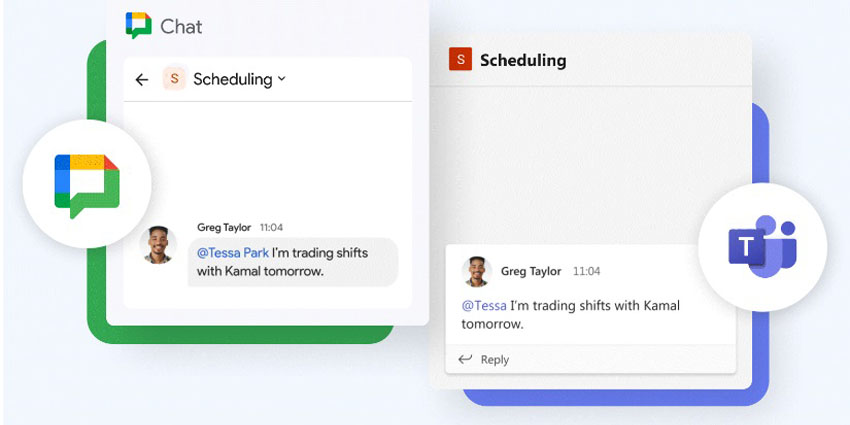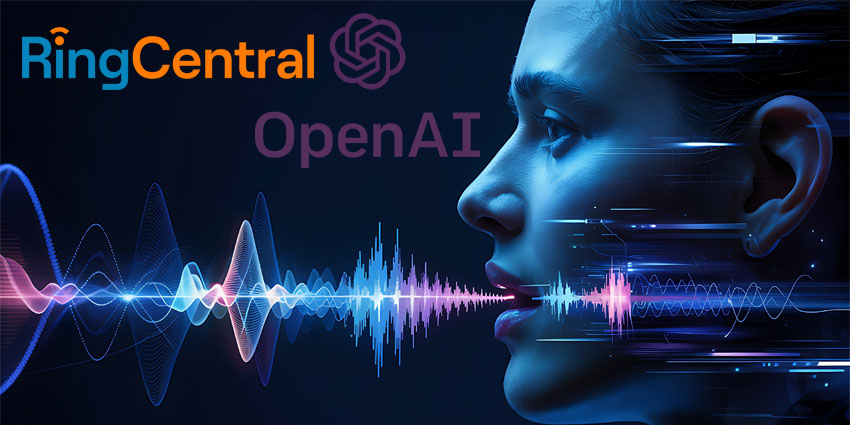Google has announced that interoperability between its Chat service and Microsoft Teams and Slack is now generally available for Google Workspace customers.
First announced at Google Cloud Next 2023 last year, the feature was previously available to Workspace customers through Google’s Beta programme, but now all Google Workspace customers can communicate with colleagues and clients on other messaging platforms.
Google wrote on its Workspace blog:
Interoperability will enable organisations that use Google Chat and other messaging platforms within their domain to provide a more seamless experience for their users.”
However, customers will need a Mio license to connect to other platforms. Mio specialises in interoperability solutions for Google Workspace and Microsoft 365. For several years, its interoperability ecosystem has encompassed Teams, Slack, Zoom Chat, and Webex.
Mio’s offering revolves around two primary use cases. The first involves internal collaboration, connecting employees who utilise various messaging platforms within the same organisation. This is particularly relevant in larger enterprises where different teams may use different tools. The second use case entails collaboration with individuals outside of one’s own organisation.
Google Cloud Next 2024
While the Teams and Slack interoperability was first teased last year, Google Cloud Next 2024 occurred earlier this month.
During that trade show, Google announced that Meet had upgraded its service with AI note-taking and translation capabilities—although this requires an extra subscription cost.
“Take notes for me” is now in public preview and allows users to engage with the conversation rather than having to take down notes or minutes manually.
Meanwhile, “Translate For Me” will be available in June and will automatically detect and translate captions in Meet. This includes support for 69 languages (equal to 4,600 language pairs), assisting users in feeling more confident and connected to their colleagues, regardless of language.
Workspace also launched Vids at this year’s Google Cloud Next, which promises to be an AI-powered video creation app singularly designed for enterprise use cases.
Vids joins Google Docs, Sheets, and Slides in the Workspace service, with full interoperability between the apps. It intends to support businesses in producing video for collaboration and productivity purposes—all within their browser rather than a separate platform.
Google prioritised simplicity and ease of use in its design, requiring no prior experience or expertise with video production software. Examples of highlighted use cases include developing a product pitch, updating your team, creating a training video, celebrating team or coworker achievements, or explaining complex concepts.
The Interoperability Push
Antitrust regulatory bodies worldwide are closely monitoring tech giant’s capacity for interoperability between their major platforms.
Earlier this month, the US Senate proposed a new bill requiring UC and collaboration platforms used by the US federal government to be more secure and interoperable, such as Zoom and Microsoft Teams.
As first revealed by The Verge, the Secure and Interoperable Government Collaboration Technology Act, brought forward by US Senator for Oregon Ron Wyden, would require government tools to communicate with each other, even if made by competitors. It would similarly introduce high standards of cybersecurity, including end-to-end encryption protocols.
Meanwhile, last month, Meta explained how WhatsApp will preserve its end-to-end encrypted messaging while remaining interoperable with third-party messaging services.
Accelerated by the European Union introducing its Digital Markets Act (DMA) for stricter regulation of designated messaging services, or digital “gatekeepers”, third-party providers must sign an agreement to interoperate with Messenger and WhatsApp before it can be implemented. While the company encourages using WhatsApp’s Signal protocol for encryption, it will accept other protocols if they meet the same security standards.
There have also been several stories of businesses, such as Cisco, launching meeting room devices that can be leveraged with Microsoft Teams Rooms, for example. Announced at Enterprise Connect last month, the Cisco Board Pro G2 is an AI-powered and touch-enabled collaboration device and is certified for Microsoft Teams Rooms.







